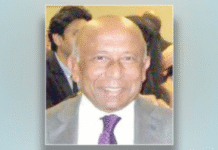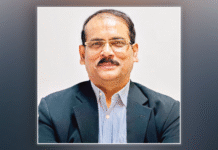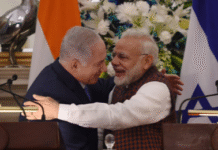Faruque Ahmed
Brisk preparations are afoot by the government to hold elections to 738 Union Parishads (Ups) in the first phase of the local body polls scheduled for March 22 at a time when the opposition parties have only one option – either they can
be on board under then government plan or stand to miss the train.
The Awami Legue leaders claim that they want to use the election to accelerate development at the grassroots and bring boost to local economy by huge election spending. Earlier it held municipal elections in December last throughout the country apparently to establish total control over local politics to ensure development at the community level, so the ruling party leaders claimed.
It appears to be a ‘spring of democracy’ for the government that is now sweeping the country but to the opposition it is a huge ‘crisis of democracy’ destabilizing the nation.
Govt. doesn’t believe in consensus
Earlier the government held city corporations elections in Dhaka and other big cities under the same game plan aimed at strengthening the ruling party’s stranglehold over city politics as part of inching towards holding the next general election under its own dispensation. The long term plan is to marginalize the opposition and hold the election without a caretaker administration.
In mayoral elections outside Dhaka where opposition BNP had won the polls, the government put those mayors on suspension using court orders for their alleged involvement in street violence. Through this deceitful plan, the government managed to handover current charges of the city mayors to ruling party councilors bringing the cities such as Sylhet, Gazipur and some others under its absolute control.
Even after the recent municipal elections, opposition mayor elects and councilors were arrested at many places and put in jail when they came up to take oath in returning officers’ office.
In the current UP elections, the government’s focus is to further consolidate its control over rural politics by holding the polls on party tickets for the first time to make strong presence of the party in local politics. BNP tried to oppose the decision on party basis but again a partisan election commission ruled it was too late and they will have to accept it.
Local body polls were held so far on non-partisan basis but the ruling Awami League now sees everything through a long political vision and wants to turn the local elected bodies thoroughly politicized for its benefit.
Political observers are opposed to such divisive local politics which may play one local group against the other but every decision is made unilaterally by the ruling party without bothering to reaching a consensus.
The government is hardly in the mood to recognize the opposition parties like BNP and Jamaat as a democratic force while accusing them of being anti-liberation forces believing that they have no legitimacy to operate in Bangladesh politics.
BNP leaders say they decided to take part in the UP polls like other local polls to expose the ruling party’s irregularities while knowing that their candidates will be forced to concede defeats.
The Election Commission (EC), was established as an independent body to handle the election matters independent of the government interference and allow the people to make their choice free from any government interference.
EC working as govt. agency
The EC was expected to work through consensus building amongst the stakeholders – both the government and the opposition – under strict compliance of neutrality and upholding election laws, but it has lost the credibility of a neutral referee. BNP on Tuesday alleged that the government and the EC are “working together” to hold the upcoming UP as per their will.
The party also alleged that around 100 of its chairman aspirants faced obstructions from ruling Awami League men while filing their nominations on the previous day and blamed the EC for not taking any action.
Election Commissioner Zabed Ali said, “It is painful if anyone created obstructions for others in submitting nomination papers” but he did not make it clear what would happen to those who failed to submit their nomination papers.
Media reports say that around 25 Awami League nominated chairman aspirants are set to be elected unopposed since they had no rival candidates to challenge them.
Mayoral elections also saw candidates elected unopposed while the last parliament election saw 154 MPs were similarly elected unopposed in absence of opposition candidates making it the highest number of unopposed lawmakers in the parliament’s history.
In the upcoming UP elections, Awami League fielded 741 chairman candidates as against 668 chairman candidates for BNP. Other parties have also nominated candidates totaling 3,569 as chairman candidates and 35,862 candidates for the post of councillor. This is first phase of the UP election. The second phase will also see almost similar number of UPs up for voting.
Source: Weekly Holiday









